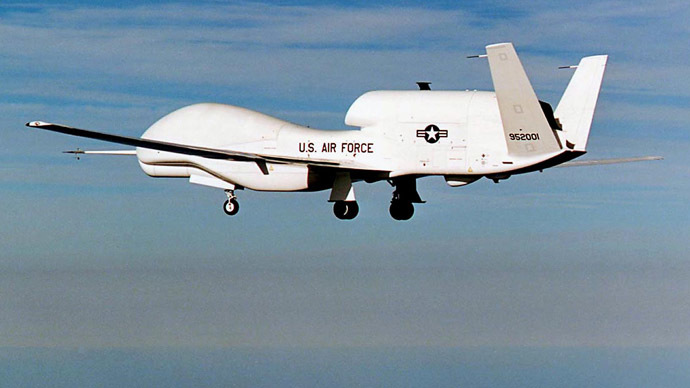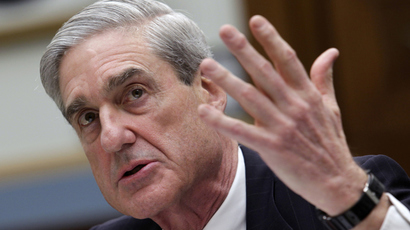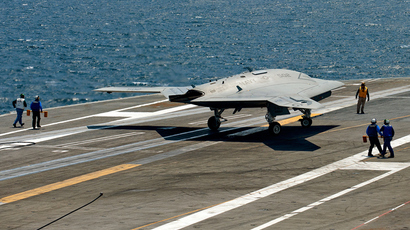Multi-million dollar domestic drone program lacks sufficient privacy safeguards, report finds

The Federal Bureau of Investigation and other Department of Justice agencies have spent almost $5 million during the last few years on an underreported domestic drone program that a government auditor says lacks sufficient privacy safeguards.
A report released on Thursday by the Justice Department's internal office of the inspector general revealed that the DoJ has invested roughly $4.9 million since 2004 on unmanned aerial systems (UAS) that allow for law enforcement agencies to conduct surveillance from the sky during certain missions.
Robert Mueller, then the head of the FBI, acknowledged only this past June that surveillance drones have been deployed within the United States.
“It’s very seldom used and generally used in a particular incident where you need the capability,” he said at a Senate Judiciary Committee hearing.
But with this week's report, the department's inspector general determined that the FBI is in need of an updated set of guidelines to govern the way unmanned systems are deployed with respect to the constitutionally-guaranteed protection from unreasonable searches.
The report revealed that while the FBI has deployed drones during the last several years, the agency failed to develop new guidelines and has instead relied on the same standards in place for traditional, manned aircraft.
Although the FBI is the only federal agency found to have used drones domestically, the auditor said that the Bureau of Alcohol, Tobacco, Firearms and Explosives (ATF) plans to deploy unmanned aircraft, and that the Drug Enforcement Administration (DEA) and the United States Marshals Service (USMS) have acquired unmanned aerial vehicles.
“While both the FBI and ATF have developed procedures guiding how to receive approval to operate UAS, officials with both components told us they did not believe that there was a need to develop specialized UAS privacyprotocols,” the auditor wrote. “During our review, FBI and ATF officials stated that they did not believe there was any practical difference between how UAS collect evidence through aerial surveillance as compared to manned aircraft. Consequently,we found that the FBI has been applying its existing aerial surveillance policies to guide how agents should use UAS.”
Citing the vast technological advances that drones have over manned aircraft, the auditor said new privacy policies should be issued to protect the privacy of Americans.
“Unlike manned aircraft, UAS can be used in close proximity to a home and, with longer-lasting power systems, may be capable of flying for several hours or even days at a time, raising unique concerns about privacy and the collection of evidence with UAS,” the report reads.
“Considering that multiple DOJ components are using or have the potential to use UAS, we believe the Office of the Deputy Attorney General (ODAG), which has responsibility within DOJ for formulating cross-component law enforcement policies, should consider the need for a DOJ-wide policy regarding UAS uses that could have significant privacy or other legal implications.”
Jay Stanley, a senior policy analyst with the American Civil Liberties Union’s Speech, Privacy & Technology Project, issued a statement in response applauding the inspector general's findings while attacking the Justice Department for its failure to adopt new standards specific to unmanned vehicles.
“No agency, including the FBI, should deploy domestic surveillance drones without first having strong privacy guidelines in place. We’re encouraged by the inspector general’s recognition that drones have created a need for privacy policies covering aerial surveillance. We urge the Justice Department to make good on its plans to develop privacy rules that protect Americans from another mass surveillance technology. Congress, however, should pass legislation introduced by Reps. Ted Poe and Zoe Lofgren that requires law enforcement to get judicial approval before deploying drones, and explicitly forbids the arming of these machines,” Stanley said.
According to the auditor's findings, the FBI used roughly 80 percent of the $3.7 million the Justice Department has invested in drones since 2006. Additionally, the Office of Justice Programs (OJP) and the Office of Community Oriented Policing Services (COPS) have handed out around $1.2 million in grants to seven law enforcement agencies and non-profit organizations across the US that used the money to purchase small drones. The unmanned vehicles used by all agencies are described as “small,” by the DoJ's definition, meaning they weigh less than 55 lbs.














